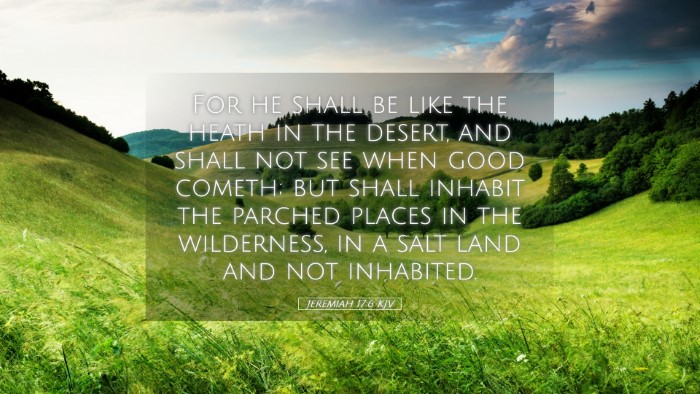Commentary on Jeremiah 17:6
This verse states: "For he shall be like the heath in the desert, and shall not see when good cometh; but shall inhabit the parched places in the wilderness, in a salt land and not inhabited." This verse serves as a poignant reminder of the spiritual condition of those who turn away from God and rely on their own strength or worldly means.
Introduction
Jeremiah 17:6 is a part of a larger narrative in which the Prophet Jeremiah contrasts the blessedness of trusting in the Lord with the consequences of relying on human strength. This commentary aims to elucidate the key insights derived from notable public domain commentaries, focusing on the implications of this verse for clergy, students, and scholars alike.
Contextual Background
Understanding the context of Jeremiah is crucial. During this time, Judah was experiencing moral and spiritual decline, with the people turning to idols and secular practices. Jeremiah, known as the weeping prophet, urges the people to recognize the folly of their ways.
Historical Setting
The historical backdrop involves the Babylonian threat and eventual exile of the Jews. Jeremiah's prophetic ministry spanned several decades before and during the fall of Jerusalem, making his messages urgent and relevant.
Exegesis of Jeremiah 17:6
In examining the verse line by line, we draw insights from Matthew Henry, Albert Barnes, and Adam Clarke.
Comparison to a Heath in the Desert
Matthew Henry describes the "heath" as a stunted and useless plant, symbolizing a life devoid of nourishment and vitality. The imagery of being in the desert illustrates desolation, pointing out that a person who forsakes the Lord is spiritually barren.
Albert Barnes further explains that the term "heath" (often translated as "juniper") reflects the lifelessness and lack of fruitfulness in a spiritually dry situation. Such a person cannot perceive spiritual good; they are blinded to the blessings that surround them.
Inhabiting Parched Places
This phrase conjures the image of isolation and distress. Adam Clarke elaborates on the implications of living in "the parched places," suggesting that the individual is continually surrounded by spiritual drought, unable to receive the living water that God offers through faith.
Moreover, Henry notes that those who depend on their own understanding live in a continuous state of emptiness, comparable to a wilderness where no growth occurs. The contrast with the flourishing tree found in the preceding verses (Jeremiah 17:7-8) emphasizes the spiritual dryness of relying on self.
Theological Implications
This verse speaks to the broader theme of dependence on God versus self-reliance in the Christian life.
Self-Reliance vs. Divine Dependence
The spiritual desolation of one who relies on their own strength is profound. This teaching not only applies to individuals but also to nations and communities. Barnes points out that nations that reject God’s guidance face similar desolation. By turning away, societies lose discernment and are scattered in moral and ethical chaos.
Understanding Spiritual Blindness
The notion of not seeing good when it comes is pivotal. Henry indicates that the root of this blindness lies in pride and a refusal to accept divine sovereignty. Individuals habitually neglecting God’s word end up missing divine interventions and blessings as they appear in life.
Practical Applications
For pastors, students, and theologians, this verse calls for serious self-examination and a call to faithful pastoral guidance.
Encouragement for Pastoral Ministry
Pastors are encouraged to lead their congregations towards reliance on God, drawing them away from secularism and self-dependence. Adam Clarke emphasizes the imperative nature of preaching dependence on God and the sustaining power of His grace.
Admonition for Students of Theology
Theological students are urged to deeply explore what it means to trust God amid challenges and uncertainties. This passage can serve as a central theme in developing a robust understanding of faith and divine providence.
Conclusion
Jeremiah 17:6 serves as a stark reminder of the consequences of forsaking reliance on God. It contrasts bleakly with the promise of blessing found in trust and dependence on Him, as described in previous verses. As believers, both individually and collectively, may we seek to root ourselves in faith, avoiding the arid condition of the heath in the desert, and instead flourish like the tree planted by waters.


